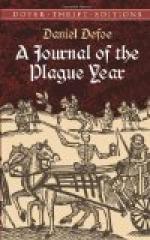We had at this time a great many frightful stories told us of nurses and watchmen who looked after the dying people (that is to say, hired nurses, who attended infected people), using them barbarously, starving them, smothering them, or by other wicked means hastening their end, that is to say, murdering of them. And watchmen being set to guard houses that were shut up, when there has been but one person left, and perhaps that one lying sick, that[141] they have broke in and murdered that body, and immediately thrown them out into the dead cart; and so they have gone scarce cold to the grave.
I cannot say but that some such murders were committed, and I think two were sent to prison for it, but died before they could be tried; and I have heard that three others, at several times, were executed for murders of that kind. But I must say I believe nothing of its being so common a crime as some have since been pleased to say; nor did it seem to be so rational, where the people were brought so low as not to be able to help themselves; for such seldom recovered, and there was no temptation to commit a murder, at least not equal to the fact, where they were sure persons would die in so short a time, and could not live.
That there were a great many robberies and wicked practices committed even in this dreadful time, I do not deny. The power of avarice was so strong in some, that they would run any hazard to steal and to plunder; and, particularly in houses where all the families or inhabitants have been dead and carried out, they would break in at all hazards, and, without regard to the danger of infection, take even the clothes off the dead bodies, and the bedclothes from others where they lay dead.
This, I suppose, must be the case of a family in Houndsditch, where a man and his daughter (the rest of the family being, as I suppose, carried away before by the dead cart) were found stark naked, one in one chamber and one in another, lying dead on the floor, and the clothes of the beds (from whence it is supposed they were rolled off by thieves) stolen, and carried quite away.




